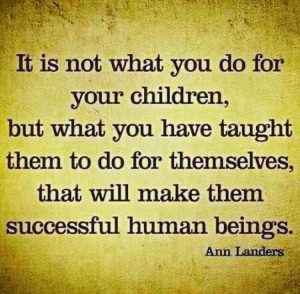If I do it, what is my student learning?
Your new Deacs will be navigating a lot right at the start of college: academics, social lives, figuring out everything from when and where to eat, to how much studying they need to do, to how to live in community, etc. They may sound stressed or overwhelmed when they talk to you.
As loving parents and families members, you might feel like you ought to be able to do something to lighten their load. Before you do so, let’s examine why that might not help your student in the long run.
If you feel the temptation to help out, before you do it, think about the fact that students tend to grow and thrive when given the space to figure things out on their own, without your intervention or direction. (If you had not read about the Stop, Drop, and Roll method over the summer, it’s worth a moment to go back and read it now).
If family members pick up work and tasks meant for students, or keep reminding them they need to do X or Y, it begs the question: “What is your student learning?” They are learning that mom, dad, or a loved one will tell them what to do (or do it for them!). It may also send an unintentional message that family members don’t trust the student to be capable to do things on their own (which is terrible for self esteem).
So I encourage you to think before you act and ask yourself “If I do X, what is my student learning?”
Let’s play this out a little more and think about things you, as a parent or family member, might be tempted to do. If you:
Call an administrative office on campus to ask how my student can accomplish a particular action…what is your student learning? Is your student learning to navigate Wake’s web site or research the answer in the appropriate policies or handbooks? Is your student building relationships with administrators or offices they need to know? (Conversely, if you are the one calling, does that disadvantage your student in terms of the kind of relationship they might have with that office? Hint: it very well might. Offices generally prefer working with the students themselves.)
Voice a complaint about something your student is experiencing…what is your student learning? Is your student learning to advocate for themselves? Are they learning to respectfully disagree with someone? Are they learning how to write a strongly-worded email or deal with someone on the phone? Are they learning how to escalate a concern to the next level if needed? And, importantly, are they learning that sometimes a policy or decision is not going to change – or that the answer they want is No – so how will they learn to adapt to that?
Do the legwork: whether that is to buy books, find a local dentist, or try to engineer an outing to help them make friends or a ride share at break….what is your student learning? Are they learning how to provide for their own basic needs? Are they using good reasoning and logic to find a reputable vendor? Are they learning how to initiate social activity and build relationships?
Parents and families are not Google, and we are not 24/7 ATMs full of answers. We don’t have to respond and provide solutions as soon as our children say they have an issue – or even at all. As a matter of fact, it is almost always better if we don’t give the answers, or take the actions ourselves.
It is completely OK for you to say in moments where your student is griping about something “Gosh, honey, I am so sorry. How are you going to handle that?” This is how students learn to be self-sufficient. They were smart enough to get to Wake; they will be smart enough to figure most things out.
It’s equally important to know that not every complaint or vent from your student is a request for help. Unless/until they say to you “I need your help here,” assume your role is to listen and support them with empathy.
We’ve got to play the long game as parents and family members – and let our students find their path, rather than guide them in every step. The goal here is to help them build independence, and that comes when they do their own work, make their own mistakes, and find their own path. And a pro tip for you: your students’ self confidence grows exponentially when they figure it out on their own.


